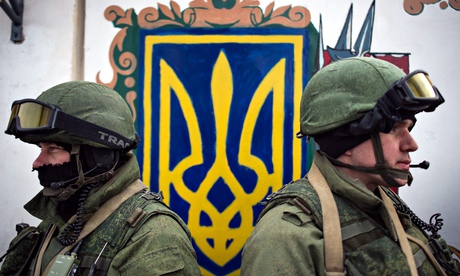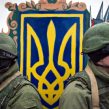
With Crimea Secure, Russia’s Focus Shifts to Ukrainian Mainland
Publication: Eurasia Daily Monitor Volume: 11 Issue: 55
By:

The last remnants of the Ukrainian military have been unceremoniously pushed out of Crimea by Russian forces, who are no longer posing as unidentified local self-defense militias. Some Ukrainian servicemen have been detained while a marines’ base in Feodosia was captured on March 24; shots were fired, but apparently there were no fatalities. The local pro-Moscow authorities accused the Ukrainian military of attempting to peddle their arms to a group of ten unidentified “terrorists,” who arrived in Crimea to organize “sabotage and diversions” (https://www.interfax.ru/print.asp?sec=1446&id=366770). The authorities in Kyiv decided not to use military force to stop the Russian takeover of Crimea, apparently believing resistance would be futile. The dilapidated Ukrainian military—for years in decline and neglect, additionally demoralized by the sudden meltdown of President Viktor Yanukovych’s regime, and which was under orders from the new authorities in Kyiv not to use force—passively stayed in the barracks as the Russians expanded control.
As the Ukrainian flag was going down in the last remaining Ukrainian outposts in Crimea, the interim Ukrainian president, Oleksandr Turchynov, announced in Kyiv on March 24, a decision by the National Security and Defense Council to withdraw all its remaining servicemen with families out of Crimea to the Ukrainian mainland. Turchynov did his best to positively spin the Crimean debacle: “Despite terrific losses [of military hardware left behind], the Ukrainian forces in Crimea fulfilled their duty by buying time to allow the rest of the Armed Forces to prepare, to heighten their battle readiness and begin a partial mobilization. Today we are ready to defend Ukraine,” continued Turchynov (https://www.interfax.ru/world/366712).
Moscow had previously stated that Ukrainian servicemen in Crimea may leave if they wish, but without military honors or their weapons. On March 24, Russian Defense Minister Sergei Shoigu inspected Russia’s newly annexed Crimea and met with former Ukrainian servicemen that decided to turn coat and join the Russian military. Shoigu appointed the former commander of the Ukrainian Black Sea Fleet, Admiral Denis Berezovsky, who defected in the first days of the Russian invasion on March 2. Shoigu handed Berezovsky his new Russian military tag with his new personnel military number. In Ukraine, Berezovsky is under investigation and a warrant is out for his arrest on treason charges. Berezovsky has also been added to the visa ban and asset freeze sanctions list by the United States and the European Union (https://www.interfax.ru/world/366741). Shoigu met other former Ukrainian commanders that have recently defected, promising they will be fully incorporated into the Russian military and allowed to serve in any part of Russia (https://www.interfax.ru/world/366745). At present, Moscow is keen to promote dissent within the Ukrainian military as well as more desertions, which may be essential if and when, after absorbing Crimea, Moscow moves on to take over more of Ukraine.
The Russian takeover of Crimea was swift, efficient and decisive. On February 22, Ukraine’s then-president, Viktor Yanukovych, strongly supported by Moscow, fled Kyiv, while the opposition, supported by street protests—the so called EuroMaidan—gained a majority in parliament (the Rada) and formed a new interim government. In Crimea, on February 27, up to 120 heavily armed gunmen, reportedly a Russian Special Forces unit, arrived from Sevastopol and occupied the regional legislature (Supreme Council) and government buildings in Simferopol. Under the control of these gunmen, who had hoisted Russian flags over the buildings, Crimean legislators installed a new strongly pro-Moscow prime minister, Sergey Aksyonov and ordered a local referendum on May 25, on the “sovereignty of Crimea” (https://www.interfax.ru/world/txt/361626). Aksyonov, who allegedly was connected to organized crime in Crimea, is a leader of a local Russian Unity party, which received 4 percent of the popular vote in Crimea during the last elections to the Supreme Council in 2010 (https://www.kianews.com.ua/node/20636).
Aksyonov, together with Supreme Council Chairman, Vladimir Konstantinov, announced the severing of all ties with the government in Kyiv, while additional crack Russian troops (marines, paratroopers and Special Forces) landed in Crimea and blockaded Ukrainian military garrisons together with pro-Moscow Cossack militias posing as local “self-defense forces”—though many of the Cossacks were in fact moved in from Kuban and other Russian regions. On March 6, Aksyonov and Konstantinov suddenly announced a referendum for March 16 to join Russia immediately (https://www.interfax.ru/print.asp?sec=1446&id=363143). Crimean Tatar leaders called for a boycott of the vote, but the officially announced results were overwhelmingly Soviet-style: almost 97 percent voted to join Russia, with a turnout of over 83 percent (https://www.interfax.ru/print.asp?sec=1448&id=365307). On March 18, Putin together with Aksyonov, Konstantinov and Alexei Chaly—a Russian businessman, declared “people’s mayor of Sevastopol” after the collapse of the Yanukovych regime—signed the treaty of accession of Crimea into Russia. On March 21, Putin signed the final paperwork to absorb Crimea, including a constitutional amendment approved in two days, while magnificent fireworks lit up the Moscow sky (https://en.ria.ru/russia/20140321/188636764-print/Putin-Signs-Final-Crimea-Reunification-Decree.html). Capture, referendum and legal annexation were all accomplished in just 22 days.
After forcing the remnants of the Ukrainian military out of Crimea, Putin can spend time and money integrating the peninsula into Russia and reinforcing the Black Sea Fleet in its now seemingly permanent home in Sevastopol. Moreover, he can now wait while the dust settles and Western indignation subsides, substituted with calls for business as usual—like after Russia’s invasion of Georgia in August 2008, which resulted in breakaway Abkhazia and South Ossetia becoming Russian protectorates. Or Putin may pause only briefly after annexing Crimea and then move on to take over other Russian-speaking Ukrainian provinces.
According to pro-Kremlin pollsters, over 90 percent of Russians support “reunification with Crimea” and Putin’s popular support has skyrocketed (https://www.interfax.ru/russia/365961). On May 25, Ukraine plans a national presidential election that may further legitimize the regime in Kyiv, which the Kremlin will likely try to actively overthrow. The temptation is high to go deep into Ukraine, before May 25, to “liberate” the south and east up to the land-locked pro-Moscow Transnistria enclave in Moldova—where Russia still has a military garrison—while Russia is ready, the Ukrainian military is weak and the regime in Kyiv remains wobbly. Putin apparently succeeded in Crimea by acting boldly and defying the threat of Western sanctions. The Russian president and his inner circle may decide the time is now or never to go on and unify the “divided Russian nation” (https://news.kremlin.ru/transcripts/20603). The possibility of a relatively easy victory seems at hand, but may soon fade away.




